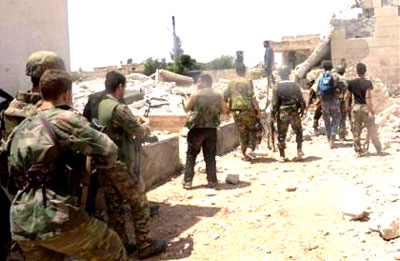
Fighting rages in Syria amid chemical attack reports
Damascus, May 27, 2013
Heavy fighting raged around the strategic Syrian border town of Qusair and the capital Damascus on Monday and further reports surfaced of chemical weapons attacks by President Bashar al-Assad's forces on rebel areas.
The Syrian military pounded eastern suburbs of Damascus with air strikes and artillery and loud explosions echoed around al-Nabak, 80 km north of the capital, where fighting has cut the highway running north to the central city of Homs, the pro-opposition Syrian Observatory for Human Rights group said.
Government offensives in recent weeks are widely seen as a campaign to strengthen Assad's negotiating position before a proposed international peace conference sponsored by the US and Russia and planned for next month.
Opposition activists said Syrian troops backed by Lebanese Hezbollah fighters were pressing a sustained assault on Qusair, a town long used by insurgents as a way station for arms and other supplies from Lebanon.
For Assad, Qusair is a crucial link between Damascus and loyalist strongholds on the Mediterranean coast. Recapturing the town, in central Homs province, could also sever connections between rebel-held areas in the north and south of Syria.
Each side gave conflicting accounts of the fighting.
The Homs branch of the National Defence Forces, formed of pro-Assad militiamen, said on its Facebook page that government forces had now divided Qusair into four sectors and had made major gains in all but the one that includes the town center.
"All of the mercenaries' supply routes were cut off completely," it said, referring to the rebels.
Islamist rebel groups, including the Nusra Front and Ahrar al-Sham, said they had sent reinforcements to Qusair. But one opposition activist said these were stuck on the outskirts and had yet to link up with the town's defenders.
"So far they are just fighting and dying, their assault hasn't resulted in much yet, unfortunately," the activist said.
Rebels posted a video of fighters in what they said was central Qusair.
"We will keep fighting to the last man here who can say 'there is no god but God'," one insurgent said.
Hezbollah's deepening involvement in Qusair has raised the prospect of renewed civil war in neighboring Lebanon, where two rockets hit the Shi'ite Muslim movement's stronghold in south Beirut on Sunday and one was fired from south Lebanon towards Israel.
The rockets struck hours after Hezbollah leader Sayyed Hassan Nasrallah promised that his anti-Israel guerrillas, fighting alongside Assad's forces, would win whatever the cost.
A Lebanese security source said another 107mm rocket, which did not go off, had been aimed at Beirut airport. The launch sites were near Aitat, in the hills just south of the capital.
UN Secretary-General Ban Ki-moon voiced "deep concern" at Hezbollah's admitted combat role and the risk that the Syrian conflict will spill into Lebanon and other neighboring states.
The US-Russian initiative so far appears only to have intensified the violence, especially around Qusair and Damascus.
In Harasta, an eastern Damascus suburb largely under rebel control, dozens of people were afflicted by respiratory difficulties after an apparent overnight chemical attack, according to opposition sources. Video showed victims lying on the floor of a room, breathing from oxygen masks.
The sides in the conflict, now in its third year, have accused each other of using chemical weapons. France's Le Monde newspaper published first-hand accounts on Monday of apparent chemical attacks by Assad's forces in April.
The newspaper said one of its photographers had suffered blurred vision and breathing problems for four days after an attack on April 13 on the Jobar front, in central Damascus.
Another video from Harasta overnight showed at least two fighters being put into a van, their eyes watering and struggling to breathe while medics put tubes into their throats.
It was not possible to verify the videos independently.
Syria, which is not a member of the anti-chemical weapons convention, is believed to have one of the world's last remaining stockpiles of undeclared chemical arms.
French Foreign Minister Laurent Fabius told reporters in Brussels there was "increasingly strong evidence of localized use of chemical weapons" in Syria and said Paris would consult its partners on what action ought to be taken.
He was in the Belgian capital for a meeting of European Union foreign ministers who discussed calls from Britain and France to ease an EU embargo on arming Syrian rebels.
All EU sanctions on Syria could collapse unless the 27-nation bloc agrees on the fate of the arms embargo before it expires on Saturday, but several EU members oppose any change.
British Foreign Secretary William Hague signaled that his country was ready to see EU sanctions lapse rather than retreat from his demand to expand support for rebels.
Austrian Foreign Minister Michael Spindelegger, whose country provides UN observers posted between Syrian and Israeli forces on the Golan Heights, opposed any arming of rebels, saying the EU should remain a "peace community".
The US-Russian initiative provides the first slim hope in almost a year for a diplomatic end to a conflict that has cost more than 80,000 lives and caused a refugee exodus that the UN refugee agency expects to top 3.5 million by the end of 2013.
China, which along with Russia, has three times blocked UN Security Council action on Syria, said on Monday it would join the proposed talks and would push all concerned towards peace.
Damascus has indicated it will take part in the talks, but the fractured opposition, which has previously required Assad's exit to be guaranteed before any negotiations, has yet to lay out its position and remains mired in internal quarrels.-Reuters







